For a Lucky Six, an Immersion in Cheese
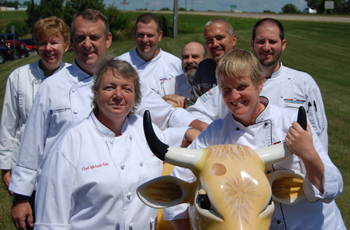 Culinary instructors from across the nation recently participated in Emmi Roth USA culinary-externship program and American Cheese Society conference events.
Culinary instructors from across the nation recently participated in Emmi Roth USA culinary-externship program and American Cheese Society conference events.
Emmi Roth USA, a subsidiary of Switzerland-based Emmi Group and a leading provider of specialty cheeses and premium fresh dairy products, recently welcomed six culinary instructors to participate in a Wisconsin Cheese Immersion at the company’s creamery and Culinary Education Center in Monroe, Wis. Admission to the program was supported by partner CAFÉ.
From July 30 to Aug. 3, the instructors experienced a comprehensive cheese immersion though hands-on cheesemaking, working alongside Emmi Roth USA corporate chefs and educational sessions. The externship coincided with the 30th Annual American Cheese Society (ACS) Conference & Competition in Madison, Wis. This national conference drew cheesemakers, specialty retailers and other industry professionals from around the country and offered additional opportunities for the externship participants.
Culinary instructors who participated in the program were Daryl Nosek, FMP, curriculum chair of culinary arts at Westchester Community College in Valhalla, N.Y.; Chris Bugher, CEC, of Mountwest Community College in Huntington, W.V.; Colin Roche, Ph.D., CEC, FMP, CHE, of Johnson & Wales University in North Miami, Fla.; Michelle Gaw of Cuyahoga Community College in Highland Hills, Ohio; J. Claire Menck, Ph.D., culinary director of The Art Institute of Wisconsin in Milwaukee; and Todd Barrios, CEC, of Stephan F. Austin State University in Nacogdoches, Texas.

 Following the recommendations identified by the acronym, WARM, you can inspire students to reach for ultimate success from the moment they return to or begin their training.
Following the recommendations identified by the acronym, WARM, you can inspire students to reach for ultimate success from the moment they return to or begin their training. Students in teams don’t necessarily have to like each other, says Chef Weiner. They won’t have the luxury of choosing their teammates in the real world, after all. But they do have to learn to work together to execute a successful meal. Here are proven tips to teach them how.
Students in teams don’t necessarily have to like each other, says Chef Weiner. They won’t have the luxury of choosing their teammates in the real world, after all. But they do have to learn to work together to execute a successful meal. Here are proven tips to teach them how. Dr. Tso-Cheng Chang was a pioneer of “no pesticides or herbicides” farming in the United States. His farm, which grows vegetables for his award-winning restaurant in Amherst, Mass., not only is one of the largest bean-spout producers in the nation, it also grows schizandra berries—which might be the ginseng of this decade.
Dr. Tso-Cheng Chang was a pioneer of “no pesticides or herbicides” farming in the United States. His farm, which grows vegetables for his award-winning restaurant in Amherst, Mass., not only is one of the largest bean-spout producers in the nation, it also grows schizandra berries—which might be the ginseng of this decade.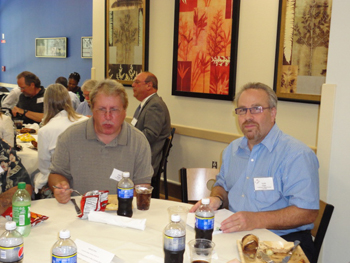 OMNI-TV host and associate producer Lucy Zilio visited the Culinary Arts Centre at Centennial College in Toronto recently to take in the sights and aromas of a live kitchen lesson. In a video (110 seconds) on the program’s website, Zilio speaks with chef and professor Samuel Glass about the special focus Centennial’s program places on international cuisine. Visit
OMNI-TV host and associate producer Lucy Zilio visited the Culinary Arts Centre at Centennial College in Toronto recently to take in the sights and aromas of a live kitchen lesson. In a video (110 seconds) on the program’s website, Zilio speaks with chef and professor Samuel Glass about the special focus Centennial’s program places on international cuisine. Visit 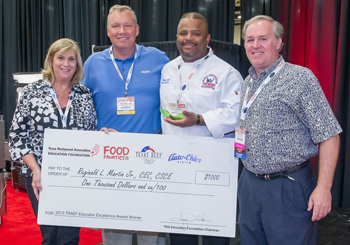 Chef Reginald Martin, culinary-arts instructor at Westside High School in Houston, Texas, is the recipient of the Texas Restaurant Association Education Foundation’s 2013 Educator Excellence Award. Martin has been leading Westside’s program since 2008 and has more than 100 students enrolled in the program.
Chef Reginald Martin, culinary-arts instructor at Westside High School in Houston, Texas, is the recipient of the Texas Restaurant Association Education Foundation’s 2013 Educator Excellence Award. Martin has been leading Westside’s program since 2008 and has more than 100 students enrolled in the program. 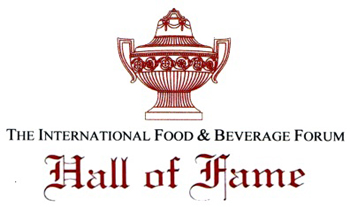 The great work of chefs and those in the hospitality industry is often gone once guests leave the restaurant, but a new Hall of Fame at the esteemed Le Cordon Bleu College of Culinary Arts in Chicago will showcase the work of the best in the industry. Le Cordon Bleu in Chicago has been chosen to house the new International Food & Beverage Forum “Hall of Fame.”
The great work of chefs and those in the hospitality industry is often gone once guests leave the restaurant, but a new Hall of Fame at the esteemed Le Cordon Bleu College of Culinary Arts in Chicago will showcase the work of the best in the industry. Le Cordon Bleu in Chicago has been chosen to house the new International Food & Beverage Forum “Hall of Fame.”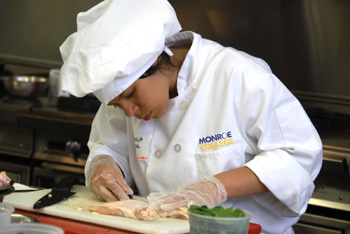 Gabriela Grande, a culinary-arts student at Monroe College in the Bronx, N.Y., has added a victory in the “Lead Like Mike” competition to her list of impressive culinary accomplishments. Grande was the 2010 America’s Best High School Chef winner, a C-CAP student from Food and Finance High School, and the first Monroe culinary student to compete at the American Culinary Federation’s Northeast Regional Conference, where she won a gold medal and finished second overall.
Gabriela Grande, a culinary-arts student at Monroe College in the Bronx, N.Y., has added a victory in the “Lead Like Mike” competition to her list of impressive culinary accomplishments. Grande was the 2010 America’s Best High School Chef winner, a C-CAP student from Food and Finance High School, and the first Monroe culinary student to compete at the American Culinary Federation’s Northeast Regional Conference, where she won a gold medal and finished second overall.